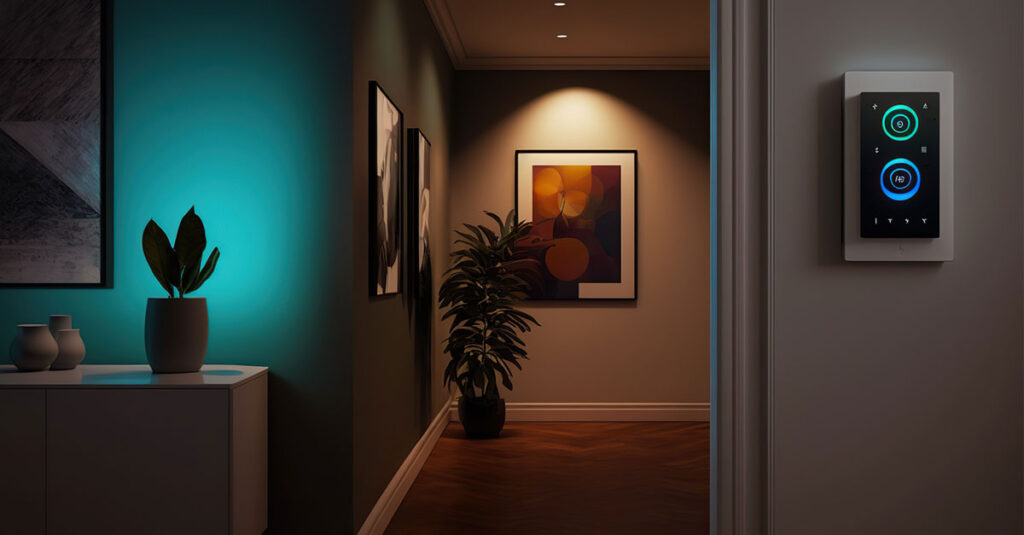
How AI Enhances Your Smart Home Automation
In the market for a new thermostat, doorbell or refrigerator? It’s an entirely different shopping experience than 20 years ago. Now, rather than just getting a fridge that looks nice and keeps your food cold, you’ll have to decide if you also want an appliance that can seamlessly fit into a smart home, leveraging automation and artificial intelligence (AI) technology to make your life easier.
It’s understandable if you need to ask yourself a few questions before making these decisions. What’s wrong with my old stuff? How do smart home automation devices actually work? Do I really need AI in my home? We have the answers to all those questions—and tips on making your home just as smart as it needs to be.
First step: Start with fast fiber internet. When you’re getting smart, this is the time to upgrade to a fiber connection that comes with a state-of-the-art router. And once you’re a Frontier Fiber customer, you can enroll in Frontier ForMe Rewards and get great discounts on some of the popular devices to turn your home into a smart home.
What is a smart home?
A smart home is a home where different appliances and devices are enabled with automation technologies like AI to perform tasks without human intervention. The end goal of automated home devices is to make life easier, more convenient and safer.
AI has generated a lot of buzz lately, thanks in part to advances that made generative AI tools like ChatGPT accessible to more people. But AI has been a part of smart home technology for longer than you may realize. And while the technology continues to evolve, the basic principles of AI have remained constant.
How does AI work?
In a smart home, automation tools like AI gather information using sensors and cameras. Then, it analyzes those incredible amounts of data to learn more about your daily habits and makes predictions based on what it has learned in order to help make a household more efficient. Examples of smart home devices that deploy AI include:
- Thermostats that determine the best ways to keep your home at an optimal temperature while also cutting back on your energy use.
- Coffee makers that learn the preferred “taste profile” of each user and brew cups exactly how they like them.
- Refrigerators with internal AI-powered cameras that can tell you when you need to restock on your favorites or suggest recipes based on what is already in the fridge.
- Medical alert systems that use AI sensors and collected health data on heart rate and exercise habits, then identify and alert caregivers to potential signs of illness. Systems can even report falls or acute health issues.
Critically, these devices are doing some work for you, whether it’s figuring out the temperature settings that slash your energy bills or creating your perfect roast. That’s the “automation” part of their function.
As AI tools become more advanced, these devices will become even better at predicting and executing what you need to thrive. In the future, you can expect more offerings from home automation companies, like appliances that alert you to what type of maintenance they need or spot something “off” in your home before you even realize it.
How to make smart home automation work for you
Not sure if you need all this tech in your home? That’s understandable. But tons of new appliances and devices are now enabled with some sort of automation and AI capacity. With this in mind, we’ve got a few tips on how to make a smart home with AI tools that work for you.
Keep security front of mind
AI works in part by collecting information about you. Depending on the device, it may track your heart rate, learn the hours you’re often home or get to know the items typically on your shopping lists. This information helps the device perform better for you. (If it notices you’re heating your house when you’re not typically home, for instance, it could design a more intelligent schedule that minimizes your energy use.)
Of course, it’s understandable to not want this information shared with third-party affiliates, or to risk hackers accessing this information during data transfers. Look to retailers who promise to use encrypted connections when they’re sending and analyzing your data. You also want to ensure they don’t store or sell your data.
Look for seamless integration between your smart products
Many different companies offer smart devices. And while they may be great in their own way, not all are designed to work seamlessly with each other. For instance, an app for your smart fridge might be optimized to work on an iPhone but not a Samsung smartphone. When you’re shopping, make sure your devices can work together to maximize the convenience your smart appliances should bring to your life. A smart home hub can help with this, too. The centralized device allows you to control and automate all the smart gadgets in your home.
Think about what “smart” means for your home
Not all automated devices are universally necessary. You may not need a doorbell that alerts you every time a package is delivered, but could use a home sprinkler system that knows when to shut off to prevent overhydration. Don’t buy tech just for tech’s sake—take a look at the options and figure out what specific features will meet your specific needs.
Stay connected to home with Frontier Fiber
When you power your smart home with the best fiber internet connection, you can rest assured you have reliable access to your smart devices whenever you want to be in touch. Learn about the advantages of Frontier Fiber. Frontier Fiber is available in select areas—check here to see when it’s available at your address. And check out Frontier’s SmartMarket for a great selection of quality smart home devices.



